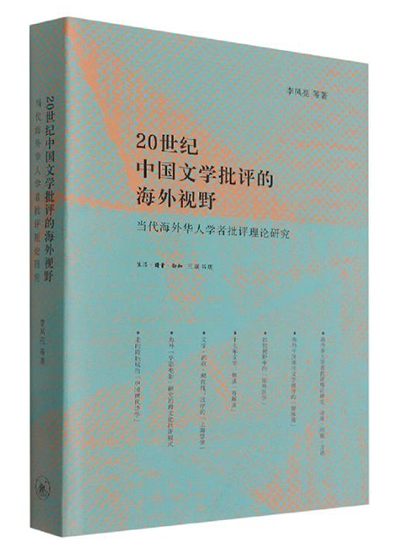Overseas vision of Chinese literary criticism

Overseas Criticism of 20th-Century Chinese Literature: A Study on the Critical Theory of Contemporary Overseas Chinese Scholars
Overseas Criticism of 20th-Century Chinese Literature: A Study on the Critical Theory of Contemporary Overseas Chinese Scholars, co-written by Li Fengliang, a chair professor from the Center for the Humanities at Southern University of Science and Technology, and others, investigates the critical theory of contemporary overseas Chinese scholars from six aspects, involving a “holistic view” of overseas modern Chinese literary criticism, the rise of the concept of “literature in the late Qing Dynasty (1644–1911)” and the expansion of research patterns, “overseas studies of Eileen Chang” in comparative visions, the “re-interpretation” of “revolutionary narratives,” “Shanghai studies” in the vision of modernity, and the cross-cultural criticism pattern of overseas research on “Chinese-language films.”
The book tries to change the discourse landscape of criticism of 20th-century Chinese literature by exploring multiple overseas concepts of modernity. Overseas Chinese scholars present the course of pursuing Chinese modernity through Romanian literary critic Matei Calinescu’s analysis of enlightenment modernity and aesthetic modernity. In the multiple interpretations of modernity, they trace the vision of modernity to the late Qing or the late Ming Dynasty (1368–1644), and give a high evaluation and positioning to late Qing or late Ming literature.
Overseas Chinese scholars, deeply immersed in the discourse field of Western critical theory, have presented a variety of theories and methods in their engagement with 20th-century Chinese literature. Their reflections on Chinese modernity are actually built on the dialogue and review of literariness, aesthetics, and historicity. For instance, from the perspective of cultural studies, overseas Chinese scholars return to the depths of history, suspend the literariness and aesthetics of “revolutionary narratives,” and demonstrate the legitimacy and superiority of Chinese modernity schemes. They affirm the key role of “revolutionary narratives” or “left-wing literature,” as a new form of aesthetic modernity, in constructing a modern nation-state in China. The “re-interpretation” of “revolutionary narratives” by overseas Chinese scholars has extended from the literary level, but intentionally goes back to historical scenes and conducts archaeological excavations.
